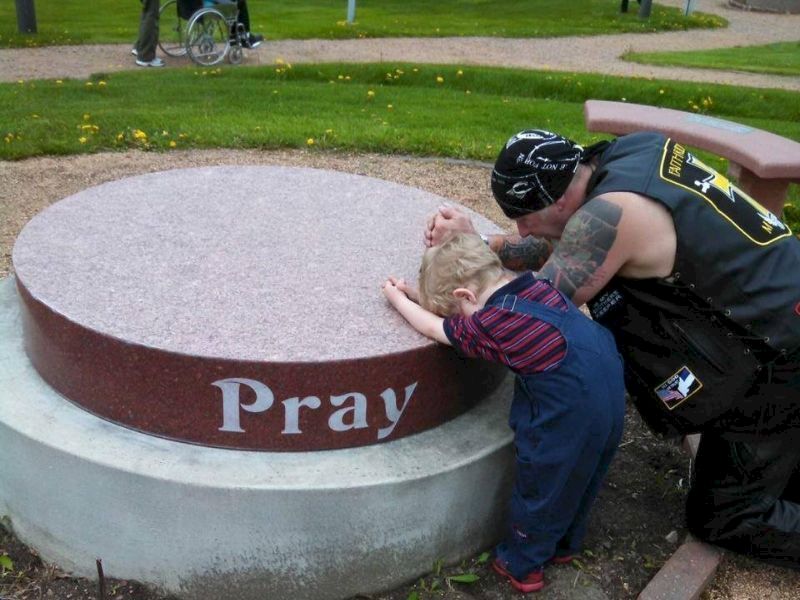Editor's Note: Every Sunday, DrydenWire.com publishes a submitted article from Pastor Brian Cole. If you would have a question for Brian or would like to learn more about him, visit his website or his Facebook page.

Genesis 17:1-5 - The Great I WILL God’s Covenant Promise Restated - Part 1
What can we count on in this world? Who can we really trust? Most people these days don’t trust their banks, they're doctors, certainly not their government, and even their spouses. So, who can we count on? Is there anyone who remains constant, true to their word, and who can be trusted absolutely?
The Bible says there is - God - who is eternal, unchanging and absolute! But there are many who either don’t believe this, or put to question:
- How can I be sure God will be there for me?
- What about when I make mistakes and make messes of my life? What if I spent my whole life running from God?
- What if I let God down? If I come back to Him, will He take me back?
- If I am faithless, how can He still be faithful? How can I know?
And these are the kinds of questions and doubts that the next part of Abram’s story deals with.
We saw last time that Abram got tired of waiting for God to fulfill His promise, and he gave in to his wife’s nagging and had a child by her maid, Hagar. He really made a mess of things with that decision. So much for the great man of faith!
Abram was 86 when Ishmael was born. 13 years later, 13 years where is seems the Lord was silent, he must have been wondering if he hadn’t messed up to the point that God couldn’t use him anymore. Was there still hope for this man who had fallen short of God’s standards?
Genesis 17 answers that question with a definite YES! The promise made in Chapter 15 were still in force. There WAS still a future for Abram. WHY? Because our God keeps His covenant with His people! And the Covenant will be our main focus the next couple weeks.
So, there’s a 13 year gap between chapter 16-17. 13 years of silence. Abram had been in the land for 24 years now, almost 100 years old and no closer to the promised land than he was 24 years earlier.
However, one of the traits of the Lord that we see consistently throughout Scripture is that it seems as if people need to come to the end of themselves before the Lord really reveals His mighty hand of power.
Because when He does reveal His mighty hand of power, then it becomes very clear who was responsible for the work and therefore who it is that gets the credit and the glory!
Vs. 1 - “When Abram was 99 years old, the LORD appeared to him and said, ‘I am God Almighty; walk before me faithfully and be blameless. Then I will make my covenant between me and you and will greatly increase your numbers.’”
After 13 years, the Lord broke His silence! And this time, when He appeared to Abram, He said: I am God Almighty - or, I am El-Shaddai! El is the all-purpose Semitic word for “god,” used throughout the ancient Near East in reference to deities of many different religions. “Shaddai” means “almighty.” A good paraphrase would be, “I am God,” specifically, the Almighty one.
This is the first time the Bible uses this name for God. This phrase shows up quite often after this point, especially in the book of Job where it is used 31 of the 48 instances in the O.T. The book of Job tells a story of another man who endured the silence of heaven. This divine name carries the concept of God as “overpowering, ever-present, eternal, omnipotent, omniscient, faithful, good, and sovereign.”
In so many words, by using this name, God was basically saying this: “I haven’t left; I’ve been here all along, Abram. Hello again. I’m the almighty one, in case you have forgotten. Because we haven’t talked for awhile, I have a few things to say to you right now. While I am sometimes silent, I remain in control of your circumstances!”
And then the Lord says to him: “Walk before Me.” God chose the image of walking, of placing one foot in front of the other repetitively and consistently.
Walking is an action that carries us from one place to another. And usually we think of walking WITH one another, but the word He uses here is “before” which in the Hebrew conveys “for, in regard to.” The walking isn’t literal, it’s an analogy referring to Abram’s relationship with God. “Walk
in regard to Me, doing the right things repetitively and consistently, day after day, over the long run of your life.”
The first command led to another: “and be blameless.” The term “blameless” means “Complete, whole, sound, unimpaired, having integrity. Not sinless - no one can achieve that! The command means to remain morally grounded, even after mistakes. And this blamelessness results from walking before God!: One is the consequence of another.
Psalm 119:1 - “Blessed are those whose way is blameless, who walk in the law of the Lord! Blessed are those who keep His testimonies, who seek Him with their whole heart, who also do no wrong, but walk in His ways!”
He is saying, “keep your eyes fixed on Me, tune your ears to My voice and your mind alert to My direction. In the process, Abram, you will discover that you have risen above the shallow superficiality of the world around you.”
Then, in verse 2, the Lord says: “Then I will make my covenant between me and you and will greatly increase your numbers.”
This wasn’t a new agreement, as we saw in Gen. 12:1-3 and 15:18-21 that God had “cut” His covenant earlier. Here He merely reconfirmed the covenant as a precursor to announcing that the time had come for the fulfillment of the first part.
For Abram to become the father of a multitude of nations, he would need to father a son with SARAI. And to memorialize this moment, God gave Abram a new name. Verse 5 - “No longer will you be called Abram; your name will be Abraham, for I have made you a father of many nations.”
As we saw in the beginning of the Abram story, His birth name “Abram” meant “exalted father,” and honored the moon god that Abram’s father worshiped. His new name, Abraham, means Exalted Father of a multitude. This had to be rough for him!! He carried this name around for 99 years! No doubt there were many times when people would ask his name, and he would reply: “Exalted Father.” Really, how many kids ya got? Well, none with my wife, but got one with her handmaiden.
And now, to make matter worse, God changes his name to Exalted Father of MANY! “How ya doing exalted father of many, how many kids ya got? One!” I imagine it had to be pretty rough for him.
The man’s name itself made him a walking example of faith! “Hi, I’m the Father of many, but not yet.”
Join us next week as we continue the story and discuss what it means that the Lord “Made” Abraham the father of many nations. Blessings to you all.
Last Update: May 31, 2020 12:45 pm CDT

















